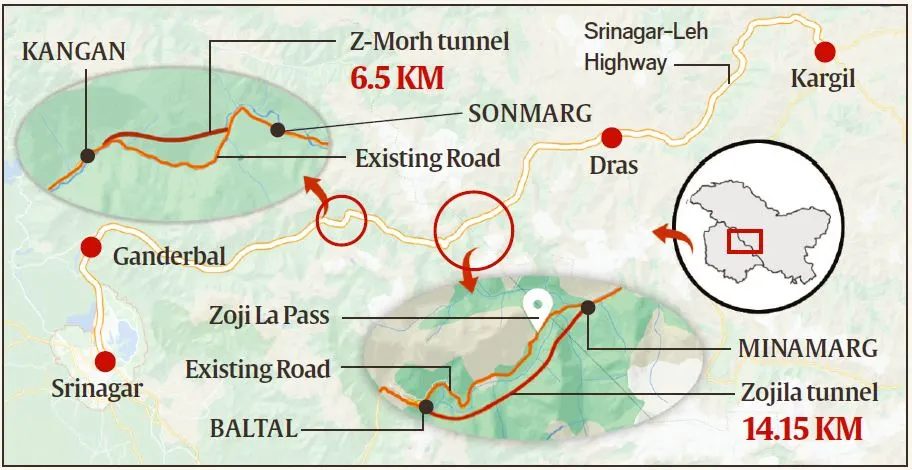Jammu & Kashmir
Z-Morh Tunnel
- 13 Jan 2025
- 3 min read
Why in News?
The Z-Morh Tunnel, inaugurated by Prime Minister Narendra Modi on 13th January, 2025, is a 6.5-kilometer-long, two-lane road tunnel connecting Gagangir in Ganderbal district to Sonamarg in Jammu and Kashmir.
- Situated at an altitude of 8,650 feet, the tunnel is designed to provide all-weather connectivity.
Key Points
- The tunnel is strategically located on the Srinagar-Leh National Highway, facilitating year-round access to the Ladakh region, which was previously hindered by seasonal road closures due to heavy snowfall and avalanches.
- Constructed at a cost of ₹2,400 crore, the Z-Morh Tunnel comprises a 6.4-kilometer main tunnel, an egress tunnel, and approach roads.
- It features a two-lane bi-directional road with a parallel 7.5-meter-wide escape passage for emergencies.
- Beyond enhancing civilian travel, the tunnel holds significant strategic importance for defense logistics, ensuring uninterrupted connectivity to the Ladakh region, which is in proximity to the China border.
- Benefits:
- The tunnel is expected to boost tourism in Sonamarg, known for attractions like the Thajiwas Glacier and activities such as whitewater rafting on the Sind River.
- By providing all-weather access, the tunnel is anticipated to stimulate economic growth in the region, facilitating trade and improving the quality of life for residents.
- The tunnel is part of the larger Zojila Tunnel project, aimed at ensuring all-weather connectivity between Srinagar and Ladakh.
Zoji La Tunnel
- The Zojila tunnel project was launched in 2018.
- The tunnel is Asia's longest and strategic bi-directional tunnel, which will provide all-weather connectivity between Srinagar, Kargil and Leh.
- Zoji La is a high mountain pass located in the Kargil district of Ladakh.
- The pass links Leh and Srinagar and provides an important link between Union Territories of Ladakh and Kashmir.
- Zojila pass remains closed during winters due to heavy snowfall, cutting off Ladakh region from Kashmir.

 2.jpg)




